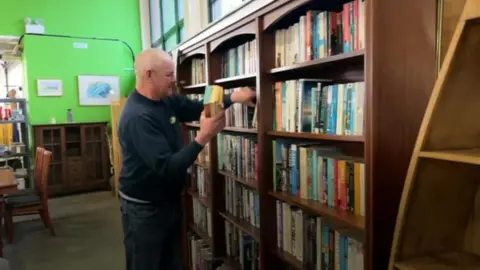Emmaus homeless project to become entirely self-funding
A community of former homeless people has expanded and is now aiming to be entirely self-funding.
New rooms have been added at Emmaus in Hampshire, and the charity can now house and support 40 people.
A new recycling centre and furniture repair shop have also boosted its money-making social enterprises.
The hunt is now on for another 10,000 sqft (3,048 sqm) of retail space to make the charity sustainable and self-sufficient.
Nigel Samuels, the CEO of Emmaus, Hampshire, said: "Our companions are responsible for generating the income to make this community thrive.
Companions
"I was quite suicidal when I was on the street," said John Sheppard, who has lived at Emmaus in Winchester for four years.
He and the other residents, known as "companions", can stay for as long as they want or need.

Mr Sheppard became homeless when his relationship ended abruptly and he was issued with a restraining order.
He said: "I was in a bad way with the drinking. I was in Basingstoke on the streets. I breached the restraining order and ended up in prison.
"But thanks to Emmaus my drinking's calmed right down.
"Every morning we get breathalysed before we start work... I didn't want to go back on the streets again, so I changed it all around.
"I'm so happy here now and I'm stable. I've got structure. I've got routine. It was the best thing I ever did."
Stability
Companions must volunteer to work five days a week on one of the community's social enterprises.
"I did a woodwork course in Andover where I built a bench," Rikki Jefferies said.
"I'd like to up-cycle furniture so I can pay back into the community."
He said without the project's structure, stability, and security he could be in prison, hospital or "dead because of the drink".
"I think we're all like-minded people," he added. "I can talk to people and they've been the same position as me, so we can all relate."
Jamie Fryer, who suffers from mental health problems, set up a more profitable system for donated books in the recycling centre.
"This is what makes it massively different to other homeless charities," he explained. "We have an input into the community."
The recycling centre was set up six months ago, paid for by a charitable donation of £20,000.
It has already generated £20,000 profit, bringing the community closer to becoming 100% sustainable.
Mr Samuels said: "They're not taking up a prison place or police time, or draining the NHS.
"They're being looked after and being responsible. So as a model, it's very cost effective."

Follow BBC South on Facebook, Twitter, or Instagram. Send your story ideas to [email protected].
